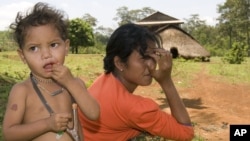MONDULKIRI Province - With July’s national election approaching, ethnic minorities say they face challenges in voting, including illiteracy and ambiguity about the voting process.
Ethnic minorities come from 20 different groups and make up about 1 percent of Cambodia’s total population. Many in the older generation cannot read or write, and they say they don’t fully understand the process, even though they are willing to go to the polls in the July 28 general elections.
Keo Dere, head of the Mondolkiri provincial office for the Committee for Free and Fair Elections, told VOA Khmer that many in these communities are becoming more and more aware of the election process.
However, problems like high illiteracy and little understanding of the process can leave villagers in remote ethnic communities at the mercy of local authorities.
Chheoum Vy, a 40-year-old Banong minority, told VOA Khmer that she does vote, but she does so with help from local officials.
“They instruct me on ticking the box with the sign of an angle throwing flowers,” she said, carrying a basket of goods home from market. “They tell me this, and I always follow them. I do not know any party.”
She has voted this way four times, she said.
The “angel throwing flowers” is represented on the party logo of the ruling Cambodian People’s Party.
Others in these remote communities say they know little about the process, but they do vote.
At a election forum in Kratie province on Wednesday, Sorn Sayarn, a 66-year-old Teang minority, said he and others in his community get little information from local authorities and are on their own to learn more about any election.
“They don’t tell me,” he said. “I know from the radio, and the I go to the commune hall to verify my name and make sure I’m on the list,” he said, referring to the local voter registry.
Sorn Houch, a 59-year-old Krochak minority from Ratanakkiri province, told VOA Khmer that local officials have told him only the CPP’s candidate will be running for election in his community.
Other minorities who spoke to VOA Khmer also said they only knew of the CPP.
Still, Keo Dere said the understanding about elections is increasing in these remote areas, especially among the young, who are often better educated or live in the cities.
“Those who live in the urban areas have become more aware about the elections, because they have access to information and have an increasing literacy rate,” he said. “Only those ethnic people of the older generation cannot read or write.”
Tep Nitha, secretary-general of the National Election Commitee, said that a lack of resources, funding or communication by authorities could create some gaps when it comes to disseminating election information to ethnic groups in rural areas. But he said the NEC is working toward spreading more information more widely.
Ethnic minorities come from 20 different groups and make up about 1 percent of Cambodia’s total population. Many in the older generation cannot read or write, and they say they don’t fully understand the process, even though they are willing to go to the polls in the July 28 general elections.
Keo Dere, head of the Mondolkiri provincial office for the Committee for Free and Fair Elections, told VOA Khmer that many in these communities are becoming more and more aware of the election process.
However, problems like high illiteracy and little understanding of the process can leave villagers in remote ethnic communities at the mercy of local authorities.
Chheoum Vy, a 40-year-old Banong minority, told VOA Khmer that she does vote, but she does so with help from local officials.
“They instruct me on ticking the box with the sign of an angle throwing flowers,” she said, carrying a basket of goods home from market. “They tell me this, and I always follow them. I do not know any party.”
She has voted this way four times, she said.
The “angel throwing flowers” is represented on the party logo of the ruling Cambodian People’s Party.
Others in these remote communities say they know little about the process, but they do vote.
At a election forum in Kratie province on Wednesday, Sorn Sayarn, a 66-year-old Teang minority, said he and others in his community get little information from local authorities and are on their own to learn more about any election.
“They don’t tell me,” he said. “I know from the radio, and the I go to the commune hall to verify my name and make sure I’m on the list,” he said, referring to the local voter registry.
Sorn Houch, a 59-year-old Krochak minority from Ratanakkiri province, told VOA Khmer that local officials have told him only the CPP’s candidate will be running for election in his community.
Other minorities who spoke to VOA Khmer also said they only knew of the CPP.
Still, Keo Dere said the understanding about elections is increasing in these remote areas, especially among the young, who are often better educated or live in the cities.
“Those who live in the urban areas have become more aware about the elections, because they have access to information and have an increasing literacy rate,” he said. “Only those ethnic people of the older generation cannot read or write.”
Tep Nitha, secretary-general of the National Election Commitee, said that a lack of resources, funding or communication by authorities could create some gaps when it comes to disseminating election information to ethnic groups in rural areas. But he said the NEC is working toward spreading more information more widely.







